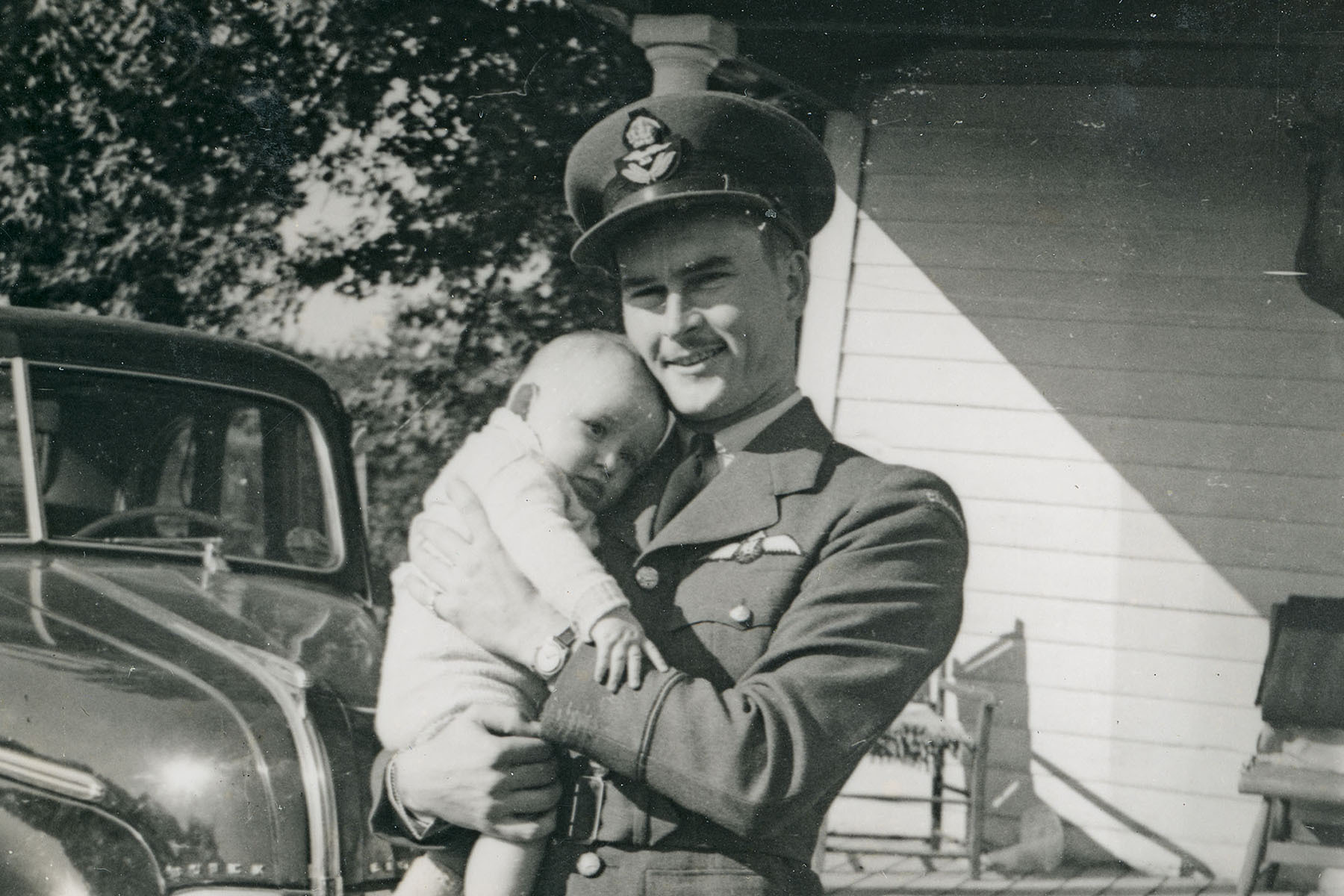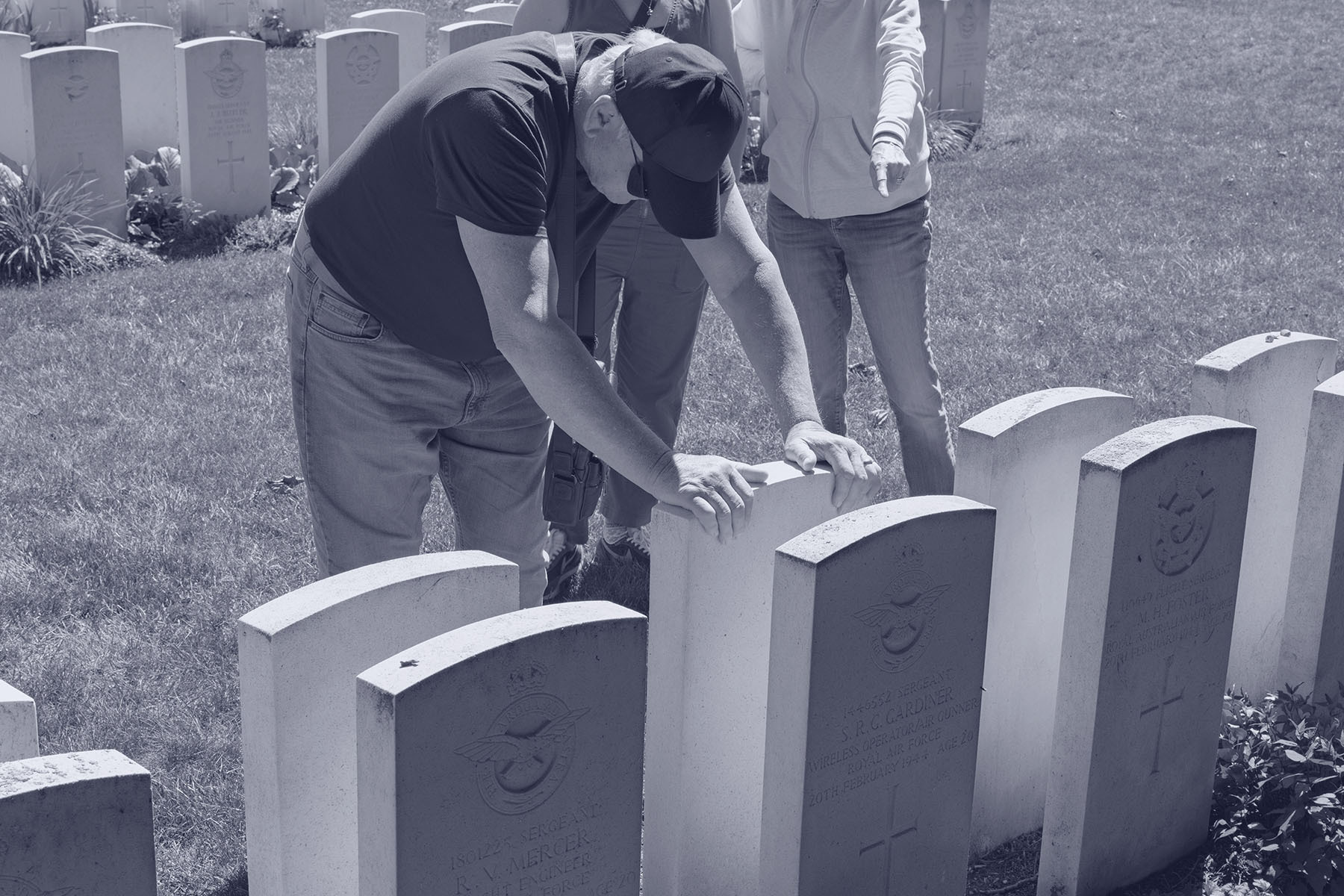
“It’s only a racetrack. There’s nothing really to see.” This is what the woman said to me over the phone. I think her underselling the racetrack maybe had to do with my accent, so very not British, and hers so obviously so. It was evident to her that we had come from far away, and this clearly meant wanting to see something more than a racetrack in rural Yorkshire, so she didn’t want to promise more than she could possibly fulfill. But, really, I didn’t want to see something; rather, I wanted to feel something, and I wanted my dad, who had travelled with me, my husband, and my mom, to feel something too. Almost eight decades earlier, this racetrack was the last place my grandfather Malcolm “Mackie” MacLeod had ever stepped foot. This was before he got on a plane the night of January 14, 1945, and then never stepped foot anywhere again. He was a bomber pilot, a flying officer. He flew Lancasters—lumbering behemoths that carried huge payloads of bombs. The planes also had the downside of being nice, big targets in the sky.
I’ve spent a great deal of time chasing after ways that might allow me to get a sense of who this person was. Though my father was only a baby at the time of Mackie’s death, my grandmother and great-aunt talked about him all the time—conjuring him up for me and my brother, figuring that the more stories they told, the more we would get to know him. But it seemed to make him less, not more, accessible. As a child, I was convinced that he was this incredible, mystical being—incomparable and incomprehensible at the same time. I learned that he could fly planes, he could play the fiddle, he could dance, he could cook, he was hilarious, he was universally loved, but most of all, he was a war hero, and he was killed in that war. But because I had no access to him, he was a fenced-off place.
When my grandmother died, we found a neatly stacked pile of letters in the back of her closet. The letters from Mackie were written on near see-through, brittle-blue army airmail stationary. I immediately started reading them, poring over the banal details of cigarette and candy requests alongside greetings to various family members, trying to pick out any sort of questioning or doubt about his purpose—the bombing, the fear, the bombing. I wanted to read insight between the lines, some wisdom. What I got was the banality of war. Waiting for something to happen and hoping nothing would. This man with the same messy handwriting as my father, the same tendency to write as he spoke, always addressing his wife as “my darling” and possessing the same self-deprecating humour. Like me, he loved romantic movies and music you can dance to, travelling to new places, and gossiping about his friends. I savoured each letter—I didn’t want the experience of learning about my grandfather to end.
In 2001, I got my first job as a college English teacher but had no real experience, so I thought I would teach what I knew: Canadian literature. I taught Timothy Findley’s “Stones,” which details the brutal aftermath, for a veteran’s family, of the Second World War’s Dieppe raid. I thought I might speak of my own family’s experience and tracked down a documentary I remembered watching in grade nine—Death by Moonlight: Bomber Command. What I hadn’t recalled from my high school history class were the stark facts about both the hundreds of thousands of civilian casualties caused by so-called “strategic bombing” and the limited survival rates of Bomber Command personnel: less than a quarter made it out unharmed. I watched, mouth agape, and then looked up more information. There had been huge controversy around the 1992 film. From the writings of newspaper columnists to a Senate Subcommittee on Veterans’ Affairs investigation, the idea that bombing civilians might have actually been part of military strategy had been angrily and rigorously challenged, as were the air force casualty rates possibly downplayed by the Canadian government. The filmmakers, Brian and Terence McKenna, stated a desire to present not only the valour but also the reality of war—the only way to prevent it from happening again. I didn’t end up showing the movie, nor did I talk about my grandfather to my class.
The former Yorkshire aerodrome, now the Croft Circuit racetrack, is in a tiny place called Dalton-on-Tees, which deserves the adjective “leafy.” Everything is green, and the place is as quiet as it is tiny. Down the road, there’s one hotel, which was a pub during the war. Even with the modern flat-pack furniture and freshly painted cream walls, the low ceilings and the age-worn bar show that this building has seen a great deal. You could imagine people, perhaps Canadian airmen during the long weeks of waiting for action, sitting at the bar and nursing pints of what they probably thought was too-warm beer. I had read in my grandfather’s letters about an evening in town when the Canadians met Americans and sang around a piano, like in the movies. Was this the place? According to the woman at the front desk, there was a church down the road. Would a guy in his twenties have attended church on the weekends? The former pub was probably a better choice, but I still could not be sure he’d have walked the almost two miles from where he was stationed to anywhere in town.
Driving through the gates of the racetrack, it seemed like we were driving into a farmer’s field, huge and desolate—surely, it was more lively on race weekends. The lack of people was good. I didn’t really want an audience. The woman I’d spoken to on the phone was there. She showed us a bronze plaque dedicated to all the British and Canadian airmen who had spent time there during the war. She pointed beyond the building, saying, “I guess you could go behind the stands on the far side of the track. That’s where there used to be a mess hall, and there are some bits and bobs of buildings.” As we got back into the car to drive around to the other side of the track, my heart was racing with excitement and hope that I might then actually feel something. Just behind the small bank of bleachers, now empty of car-racing fans, outlined on the ground in gravel was, as promised, the remains of some old Royal Canadian Air Force buildings. Unlike the former pub and the church, here I could be sure that my grandfather had actually stood in this space. He’d eaten here. He’d laughed here. He’d written letters here, hunched over, balancing the airmail paper on his leg. Surely, he’d been desperately fearful here. My father and I walked around. He was quiet. We hugged. It was at this moment that the father he had heard about became, as he put it, “Dad.”
Mackie’s last mission was to bomb the Leunawerke synthetic oil factory, a target near Merseburg, at the time one of the most heavily defended parts of Germany. My grandmother had always told me that there was a collision in the air, with only the tail gunner surviving and the rest of the crew dying instantaneously. Documentation I have been able to find, including some released by the Canadian government only two years ago, tells a more harrowing tale. It appears that the bomber was shot down, most likely hit by a night fighter from below and finished off by flak. Though Lancasters have minimal armour, the pilot is protected by an armoured seatback. My grandfather would most likely have felt the impact but wouldn’t have been able to do anything, given that the pilot’s parachute was held outside of the protected cockpit. There is a good chance he would have known and experienced the full horror of his fate—falling out of the sky to land in a field and be left for days before his body was buried in a temporary mass grave, later identified only by a label in his underpants.

Whatever remained of Mackie is now found in the Commonwealth War Cemetery in Berlin, thousands of miles away from the Ottawa Valley, where he grew up. On the way to see the grave, we stopped in Bochum—a modern-looking city, walkable and convenient. The purpose of the stop was to meet with family friends as well as my own friend Verena, a renowned historian who works at the local university with her geologist husband. We had met at academic conferences over the years and connected over our fathers’ health issues. I was looking forward to seeing her new apartment. It was in a building that looked different from others, with far more detail than its mid-century cement neighbours. The building was the only one, aside from a church, that had survived the impact of bombing—in an ironic twist, specifically by my grandfather’s 431 Squadron. Bochum saw massive destruction, with 83 percent of the city’s homes obliterated. We sat in Verena’s bright living room, next to her husband’s office—a space which still has marks from supposed strategic bombing eight decades earlier.
Over the course of our travels, I’d been making a series of TikToks, reading my grandfather’s letters and posting relevant clips of research for my father to follow along and to make it possible for him to relive the trip after our return home. I had no sense of a wider audience, but the footage of monuments and pictures of planes had gained minimal traction. For some reason, I thought I might record my admittedly less-than-erudite thoughts about the horrific realities of war, but also recognizing the importance of seeing the Bomber Command as having fought for a reason. Could Mackie be a hero, or does that deny the loss of life inherent in what he accomplished as a flying officer? Within moments of posting this video, I was inundated with angry comments: “War is War,” “war is hell get over it,” “they had to be bombed to oblivion,” “sow the seed reap the whirlwind,” and on and on. I did the thing you aren’t supposed to do and tried to argue, talking about the human impact and what it means to bomb civilian populations. I ended up crying, just wishing I didn’t feel so stupid.
The Commonwealth War Cemetery is a short walk from the Olympic stadium, site of the infamous 1936 Olympics. When we were there, the Euro Cup of Football was underway. The cemetery is just off a main road and contains 3,595 war graves, with flowers planted between each of the white tombstones. The landscaping is pristine, and the design of the monument is similar to that of the Bomber Command memorial in London, though this cemetery has been around for almost seventy years. The memorial was erected only in 2012, paid for by private citizens. Winston Churchill did not mention the Bomber Command in his victory speech. The bombing meant 600,000 civilians were killed in the quest for that very victory.
Per ardua ad astra—through struggle to the stars. The official wartime motto of the RCAF seems to indicate exactly what my path toward understanding my grandfather has been like. He died in the war. So did so many others—civilians as well as from the military. And even though I read and reread my grandfather’s words, I am unable to come to any conclusions. I can’t bear to read his final few letters—the last words he wrote before he flew into the night. I don’t want them to end. I want to keep memorializing, keep thinking. And maybe that’s the point. I have to keep going, questioning, struggling to come to any conclusion about why it is that we do this. We’ll never make it to the stars otherwise.







